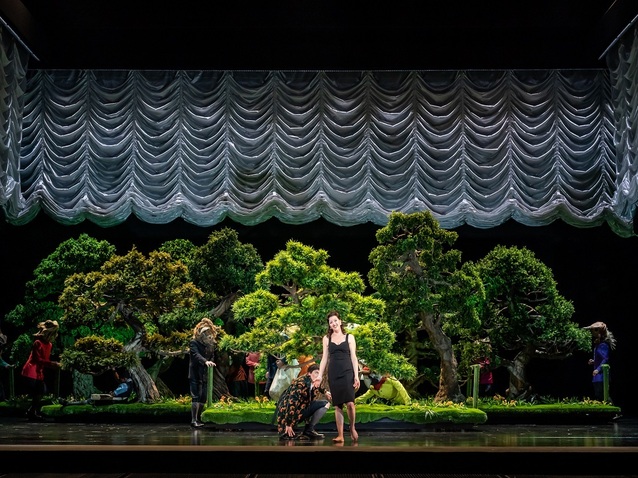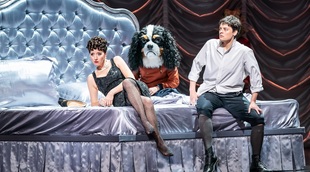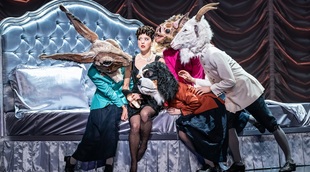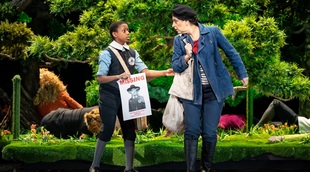 © Marc Brenner
© Marc Brenner
The story to be found in Handel’s Alcina of 1735 comes from Ludovico Ariosto’s epic sixteenth century poem Orlando furioso. This had already been employed by Francesca Caccini in La liberazione di Ruggiero dall’isola d’Alcina of 1625, which is recognised today as the first opera to be written by a woman. Handel himself used the libretto of L'isola di Alcina, an opera that was set in 1728 in Rome by Riccardo Broschi, which he acquired the following year during his travels in Italy.
The plot sees the heroic knight Ruggiero trapped on an island by the sorceress Alcina, who has used her supernatural powers to make him love her and forget all about his fiancée Bradamante. Alcina’s isle is, in fact, a desolate place, but through magic she has made it appear green and lush. In this way, she has seduced every knight who has come to it, and then turned each into a stone, animal or plant once she has lost interest.
When Bradamante, disguised as a man named Ricciardo, and Ruggiero’s former tutor Atlante, under the guise of the sailor Melisso, journey to the island to find Ruggiero all manner of misunderstandings arise. For example, Alcina’s sorceress sister Morgana, believing Ricciardo is really a man, falls in love with him, much to the consternation of her own lover Oronte who challenges him to a duel. Meanwhile a boy called Oberto searches the isle for his missing father Astolfo, who he does not know has been transformed by Alcina. When Bradamante finds Ruggiero, he does not even recognise her but over time, with the help of Atlante, he realises the truth and attempts to escape from Alcina’s clutches. At this point, it becomes clear that Alcina really does love Ruggiero. With her feelings for once being genuine she no longer has any recourse to deceit or artifice, which leads her to lose her powers and finally to the release of all the knights from their enchantment.
In Richard Jones’s new staging for the Royal Opera, a co-production with New York’s Metropolitan Opera, the setting is broadly the modern day and the contrast between the real but dull and the glamorous yet artificial is clear from the start. The Prelude sees a group of performers dressed in simple black, white and blue colours gather around ready to sing. Their scores, like the stage curtain, sport a logo proclaiming “The Only Path: Love, Duty, Courtesy, Mercy”, which reflects what Atlante once taught Ruggiero. Then Alcina appears, freezes them and removes their music. On one level, this symbolises her transforming the knights, and on another it makes a statement that this is not going to be a traditional, worthy staging, but rather a whole lot of fun.
In this vein, the enchanted knights do not represent a combination of animate and inanimate objects. Instead, all become animals such as dogs, parrots, goats and hares with beautifully crafted masks topping otherwise human clothes. The opera contains several musical sequences that were originally composed for the dancer and choreographer Marie Sallé, and by keeping the animals upright on two legs it gives them the opportunity to engage in much entertaining dancing, courtesy of movement director Sarah Fahie, such as during Morgana’s aria ‘Tornami a vagheggiar’. The animals also act as servants to Alcina, which is an interesting touch because, while this could be seen as resulting from their enchantment, it also suggests a degree of complicity on their part.
The urn, which is the source of Alcina’s magic, becomes a huge bottle of perfume that the sorceress sprays people with in order to enslave them. Here, she actually turns ‘Ricciardo’ into a squirrel by squirting him before relenting and changing him back when normally in Act II she is persuaded against transforming him in the first place. When Atlante enables Ruggiero to see that the island is pure artifice, we are also shown how everything is an illusion by having the spectacle reduced to just this bottle and a few animal masks. In fact, in Antony McDonald’s set, the audience is given multiple perspectives on the scenario throughout by having the ‘green meadows’ of which Ruggiero sings wheeled on and off periodically, so that it experiences both the illusion and the stark reality of a bare stage when these are absent. There is one downside to this decision, which is that, because we become used to seeing both, the bare landscape does not register any more in our minds when Alcina’s powers begin to wane. However, the sad sight of Oberto searching for his father with ‘Missing’ leaflets at some of the opera’s most exuberant moments ensures that the production is always a multi-layered affair.
Baroque specialist Christian Curnyn’s conducting is superb, while the cast is outstanding. Lisette Oropesa is stunning in the title role as her gorgeous soprano proves particularly adept at capturing the fear and sorrow Alcina feels as her power wanes and forces move against her. As Ruggiero, Emily D'Angelo’s mezzo-soprano is highly intriguing and persuasive in both the lower and upper registers. As Bradamante, Varduhi Abrahamyan’s sound is as secure as it is undoubtedly beautiful, while Mary Bevan as Morgana, Rupert Charlesworth as Oronte and José Coca Loza as Atlante are similarly excellent. Finally, while Oberto will often be sung by a soprano, here the part is actually played by a twelve-year old boy. Malakai M Bayoh, who shares the role across the run with Rafael Flutter, displays an extremely delightful and accomplished sound, while also capturing the right sense of innocence in a child who, being entirely oblivious to the machinations of others, simply wishes to see his father once more.
By Sam Smith
Alcina | 8 - 26 November 2022 | Royal Opera House, Covent Garden
the 11 of November, 2022 | Print



Comments